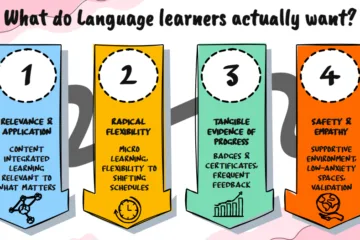You’ve probably heard all the usual advice about language learning: practice daily, watch foreign films, download an app. But here’s something most corporate training programmes miss entirely – the power of contextual immersion within your actual work environment.
What if I told you that the most effective corporate language learning happens when your team practices real workplace scenarios rather than memorising verb conjugations? This isn’t your typical language learning approach, and it’s precisely why forward-thinking companies are seeing remarkable results.
The workplace context advantage
Traditional language classes teach you to order coffee in Paris, but corporate training should prepare your sales team to close deals in São Paulo. The difference is enormous. When employees learn business languages through role-playing actual client presentations, negotiating contracts, or handling customer complaints, they’re building confidence alongside competence.
This contextual approach explains why small group classes with professional tutors consistently outperform generic online programmes. At Chat Laboratory, we’ve spent nearly two decades perfecting this method. Our corporate language training focuses on the vocabulary, phrases, and communication patterns your team actually needs – not textbook scenarios they’ll never encounter.
Why your brain loves relevant learning
Here’s the science bit: your brain retains information better when it’s immediately applicable. When your marketing manager practices presenting quarterly results in Spanish during language classes, they’re creating neural pathways that connect language skills directly to job performance. It’s learning with purpose, and it sticks.
This is why team learning works so brilliantly. Colleagues can practice together, share industry-specific terminology, and build confidence as a group. They’re not just learning a language – they’re enhancing their collective professional capability.
Making it work for your business
The most successful corporate learning initiatives we’ve seen share common characteristics: they’re regular, relevant, and realistic. Weekly sessions work better than intensive courses because consistency beats intensity for long-term retention.
Whether your team needs to improve English communication skills or master a new market’s language, the key is making every lesson count towards real business objectives. After all, language learning should be an investment in your company’s future, not just another box to tick on your training calendar.
Ready to discover what contextual corporate language training can do for your team?



0 Comments